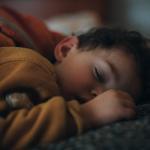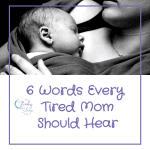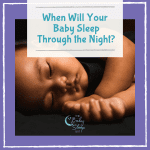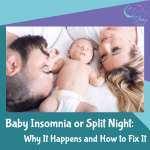
If your baby or toddler is waking often at night, you are no doubt struggling to find the reason why (and that list of reasons for night waking can be long!). You’re no doubt doing all you can to ensure your baby is well-rested with adequate daytime naps, well-nourished, comfortably-dressed at bedtime, and that you always kick off the night with a sleep-inducing bedtime routine.
And if you’ve been reading our blog for awhile, then you may also be working on sleep coaching by gently weaning your child away from sleep associations, and ensuring that your baby or toddler can fall asleep independently. (That is the root of sleeping through the night, after all.)
BUT…what if you’ve done your due diligence, and your baby is STILL waking often at night? Or, even worse, what if your baby is waking often at night, and is cranky and grumpy and seems overly tired during the day?
We’re looking in today’s article at an under-diagnosed, often-hidden reason why a number of babies and toddlers wake at night and aren’t getting the rest they need: sleep apnea.
Why Sleep Apnea May Be Pediatric Medicine’s Most Damaging Oversight
First, a disclaimer – we are not doctors, and we do not dispense medical advice. If you suspect your child has a medical condition that’s affecting sleep, we urge you to make a beeline for your doc’s office, and to get an evaluation by a medical professional.
Okay, now that that’s out there – let’s talk about sleep apnea. If you’re like me, sleep apnea is a term that’s barely on your radar as a parent – because isn’t that something that adults suffer from?
Well, yes – but kids do, too. Including babies. And it’s becoming clearer and clearer that sleep apnea (particularly obstructive sleep apnea, or OSA) is wildly under-diagnosed among children. Statistically, around 1-3% of children have diagnosed sleep apnea, but according to this article, it’s more probable that 10% of children actually have this problem.
Why does this matter? Because sleep apnea causes a whole host of serious problems, including developmental delays, failure to thrive (in infants), ADHD (in big kids), memory and learning problems, headaches, frequent nighttime waking, chronic over tiredness, and general crankiness and irritability. In rare cases, the complications of sleep apnea (including frequent exhaustion and irritability) can lead to extreme problems, like the case of a young Chicago boy whose sleep apnea made him so tired, it nearly caused him to be expelled from school and sent to a behavioral health hospital.
These serious complications of sleep apnea in children have led some to call its under-diagnosis pediatric medicine’s most damaging oversight.
Why Sleep Apnea In Babies and Toddlers Matters, Too
Do a quick Google search, and you’ll see that the majority of sleep apnea articles out there are geared towards adults – and that makes sense, when you consider that sleep apnea affects more adults than it does children. It’s also true that children will often outgrow mild sleep apnea problems, while adults won’t.
But here’s the thing – sleep apnea in babies and toddlers absolutely shouldn’t be ignored, or dismissed as a small or insignificant problem. Sleep apnea seriously impacts your baby’s oxygen levels at night, and is damaging to the overall quality of your child’s sleep. Babies and toddlers with sleep apnea tend to wake more often at night than kiddos without, and even when they’re asleep, their sleep isn’t as high-quality as the sleep of child without sleep apnea.
Types of Sleep Apnea
Let’s back up a bit and identify the two main types of sleep apnea that you’ll want to be aware of: Central Sleep Apnea and Obstructive Sleep Apnea. Obstructive sleep apnea is the more common type, and impacts older babies, toddlers, children, and adults. With obstructive sleep apnea, sleep is interrupted because the airway is actually partially blocked (which can happen for a variety of reasons). Central sleep apnea is less common, and usually occurs in premature babies. With central sleep apnea, the brain fails to send the proper signals to the muscles that control breathing.
An easy way to keep this straight is to remember that obstructive sleep apnea means your child has trouble breathing due to the airway being blocked. Central sleep apnea means your child stops breathing altogether for a brief period of time (up to 20 seconds, usually).
Now, it’s important to note that while central sleep apnea is not the same thing as SIDS, it can be fatal – therefore, it’s important to treat it seriously. Here’s a tip from Miriam, our resident nurse:
“Pauses in breathing of 19 seconds or less are common in newborns, and as long as it is not accompanied by a slowed heart rate, change in color or muscle tone, it’s considered to be harmless and common. If pauses in breathing are 20 seconds or longer, however, or less than 20 seconds but accompanied by a slow heart rate, change in color, or muscle tone then it’s time for a trip to the ER for diagnosis.”
Keep in mind that premature infants are especially prone to central sleep apnea, and typically need to wear apnea monitors to ensure safe nighttime sleep.
Symptoms and Causes of Sleep Apnea
So, what are the signs of sleep apnea for which you should be on the lookout? Glad you asked! Central sleep apnea is fairly easy to detect – your baby will stop breathing for a noticeable period of time – but obstructive sleep apnea can be much harder to spot. It also tends to last much longer than central sleep apnea, and not all children outgrow it.
Significant symptoms of obstructive sleep apnea include…
- Snoring
- Loud, noisy breathing (especially mouth breathing)
- Frequent nighttime wakings
- Early morning waking
- Restless sleeping, and strange sleeping positions
Additional problems that may be related to sleep apnea, but aren’t necessarily red flags, include….
- Recurring sore throats or tonsillitis
- Asthma that isn’t well-controlled, despite medication and medical care
- Constant ear infections
- Constant overtiredness, despite a healthy sleep schedule and healthy sleep habits.
Once your child is older, you’ll want to watch for these “big kid” symptoms of sleep apnea:
- Daytime sleepiness at preschool or during class, in spite of what seems like adequate nighttime sleep.
- Difficulty waking up in the morning
- Difficulty falling asleep at bedtime.
- Bed-wetting (in children who are potty-trained and otherwise dry during the day)
- ADD or ADHD diagnosis that isn’t helped by medication
One Last Word: Fixing Sleep Apnea May Not Fix All Your Sleep Problems
If sleep apnea is your baby or toddler’s ONLY sleep problem, then getting medical care and addressing the sleep apnea may very well mean your sleep issues are solved.
However, if your child does not yet know how to fall asleep independently, and relies on you for help with falling asleep, then addressing the sleep apnea – while it’s a step in the right direction – will likely not lead to sleeping through the night. Instead, you’ll need to focus on gently teaching your baby how to fall asleep without your help. And you don’t have to do that alone. You can call in a pro to help with your baby’s sleep. Us!








